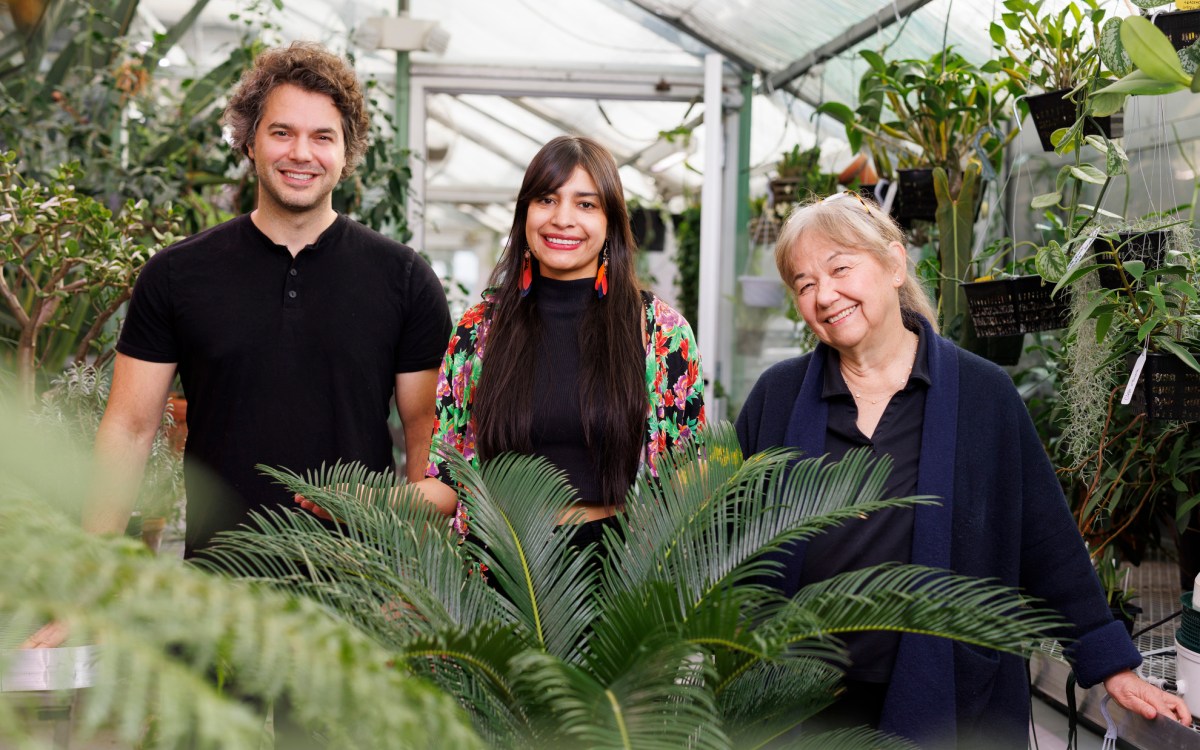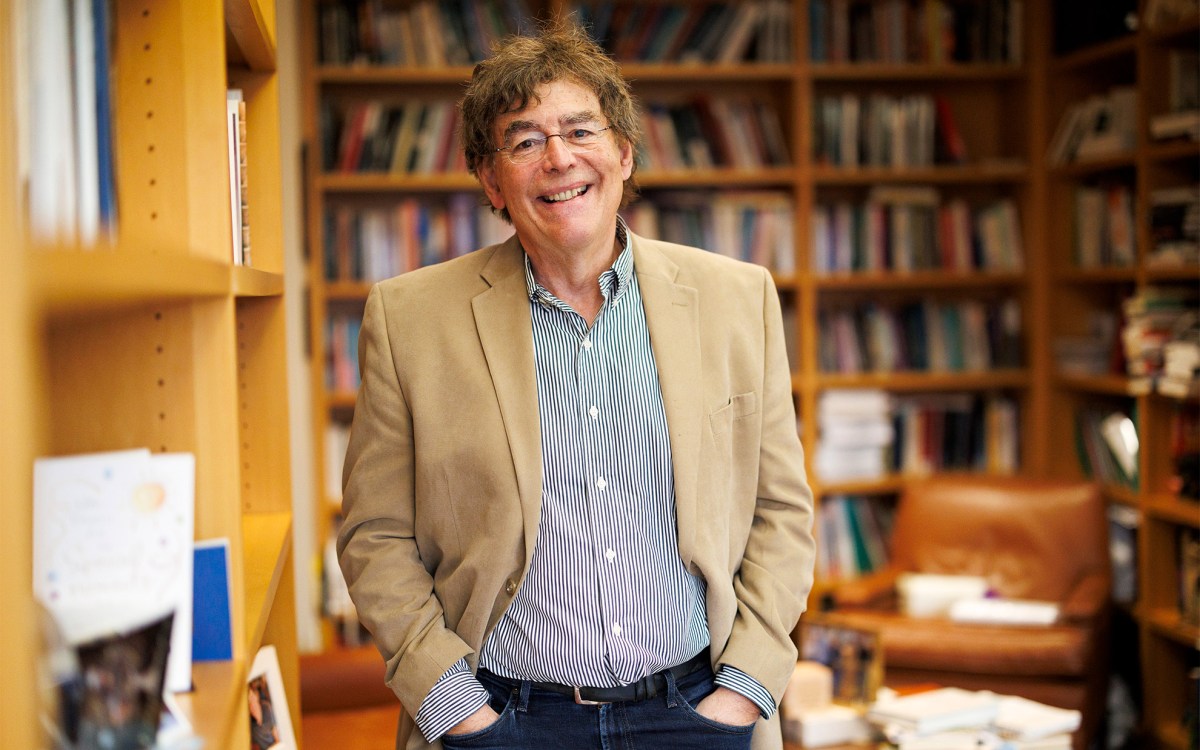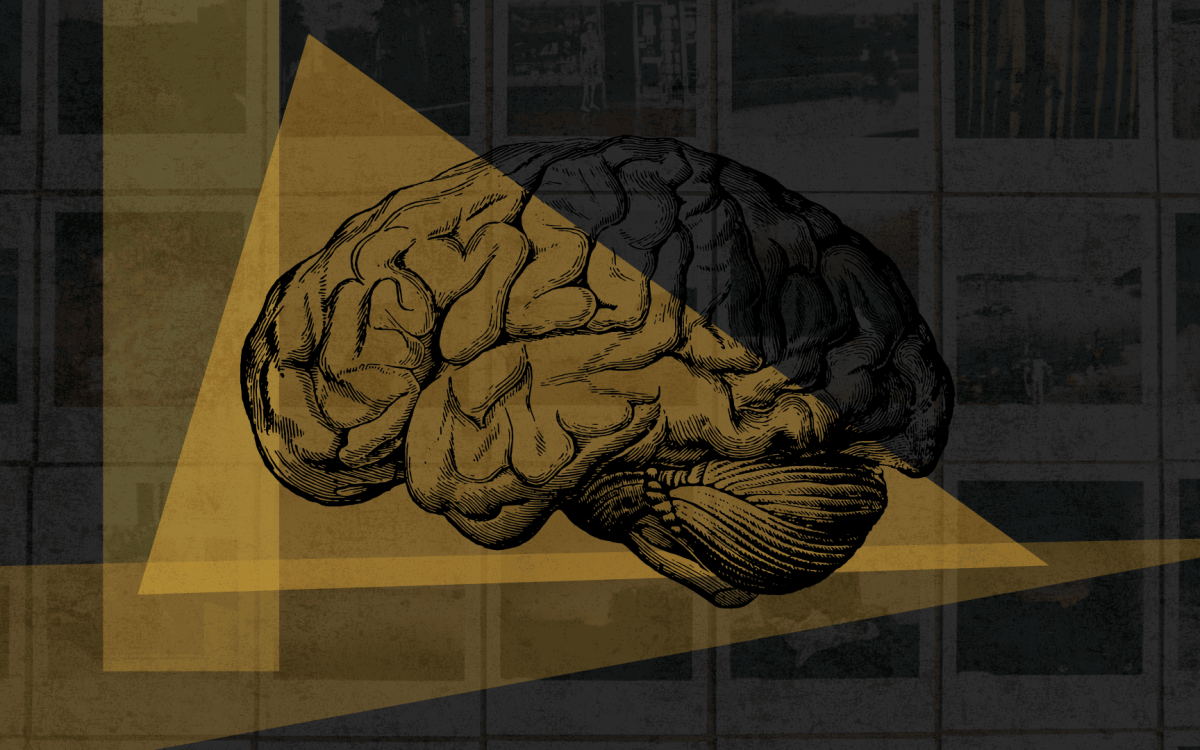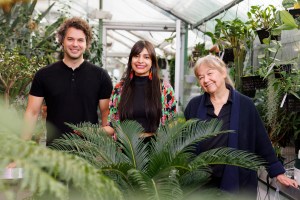Science & Tech
-

Rethinking — and reframing — superintelligence
Microsoft researcher says separating AI from people makes systems dangerous and unproductive
-

First, male gets heated up, then female, and then, you know
Study shows infrared radiation from plants serves as invitation to pollinating insects
-

‘Consciousness’
What we know and don’t know about the life of your mind
-

Science needs contrarians, and contrarians need support
Institute of Quantitative Social Science initiative tailored to researchers exploring provocative ideas
-

Cracking the code of why, when some choose to ‘self-handicap’
New research also offers hints for devising ways to stop students from creating obstacles to success

-

How memory works (and doesn’t)
In podcast, scientists explain why remembering is more reconstruction than replay
-
Harvard turns wind into power
Watch your footing on those slippery winter sidewalks in Cambridge. But if you’re at the corner of Dunster and Mt. Auburn streets, take a minute to look up.
-
Exotic force seen for first time
For the first time, researchers have measured a long-theorized force that operates at distances so tiny they’re measured in billionths of a meter, which may have important applications in nanotechnology as scientists and engineers seek new ways to create devices too small for the eye to see.
-
Mining exec: Coal vital to energy mix
The leader of one of the nation’s largest coal mining companies said Tuesday (Feb. 3) that coal is a vital part of the nation’s energy mix and that clean coal technology must be developed if the atmosphere is to stop warming.
-
The genes in your congeniality
Can’t help being the life of the party? Maybe you were just born that way. Researchers have found that our place in a social network is influenced in part by our genes.
-
Global temp analysis clarifies warming details
An analysis of global temperatures between 1850 and 2007 has illuminated some climate change details, showing that winter temperatures have risen more rapidly than summer temperatures and that the seasons are coming nearly two days earlier than they were 50 years ago.
-
Riding — and reading — the Earth tide
Once a day, Miaki Ishii rides the Earth tide, rising slowly — along with her desk, chair, and entire office — 20 to 30 centimeters before sinking back again.
-
The genes in your congeniality:
Can’t help being the life of the party? Maybe you were just born that way. Researchers at Harvard and the University of California, San Diego, have found that our place…
-
Implants mimic infection to rally immune system against tumors
Harvard bioengineers have shown that small plastic disks impregnated with tumor-specific antigens and implanted under the skin can reprogram the mammalian immune system to attack tumors. The research — which…
-
Hotter seasons coming earlier, research finds
An analysis of global temperatures between 1850 and 2007 has illuminated some climate change details, showing that winter temperatures have risen more rapidly than summer temperatures and that the seasons…
-
Transit search finds super-Neptune
Astronomers at the Harvard-Smithsonian Center for Astrophysics havediscovered a planet somewhat larger and more massive than Neptuneorbiting a star 120 light-years from Earth. While Neptune has a diameter3.8 times that…
-
Researchers find new molecule to block ‘Hedgehog’ signaling in cancer, development
Researchers have achieved a feat drug developers had thought difficult, if not impossible, discovering a compound that blocks the functioning of a key developmental protein by binding to an “undruggable”…
-
Inmates suffer from chronic illness, poor access to health care
The nation’s prison and jail inmate population struggles with high rates of serious illness and poor access to care, according to the first nationwide study of inmate health and health…
-
“My genome, my self”
One of the perks of being a psychologist is access to tools that allow you to carry out the injunction to know thyself. I have been tested for vocational interest…
-
Researchers control the assembly of nanobristles into helical clusters
From the structure of DNA to nautical rope to distant spiral galaxies, helical forms are as useful as they are abundant in nature and manufacturing alike. Researchers at Harvard’s School…
-
Researchers see exotic force for first time
For the first time, researchers have measured a long-theorized force that operates at distances so tiny they’re measured in billionths of a meter, which may have important applications in nanotechnology…
-
Milky Way bigger, faster than previously thought
Our own Milky Way galaxy, long considered a “little sister” to the larger Andromeda Galaxy, is all grown-up, according to new research presented today that shows the Milky Way to be bigger and faster than previously thought.
-
New visualization techniques yield star formation insights
New computer visualization technology developed by the Harvard Initiative in Innovative Computing has helped astrophysicists understand that gravity plays a larger role than previously thought in deep space’s vast, star-forming…
-
John P. Holdren named President-elect Obama’s Science Advisor
President-elect Barack Obama today announced that he has selected Harvard’s John P. Holdren to serve as Assistant to the President for Science and Technology in the new administration. The post,…
-
Fair shows progress of humanities in digital world
Bill and Carrie meet in a Harvard College library you might know. The walls are reddish stone and in one corner a working fireplace blazes brightly.
-
‘Bicycle Environments’ takes HSPH and GSD students for a ride
At a time when the United States scrambles to resolve the country’s obesity epidemic, reduce greenhouse gas emissions and air pollution, and lessen dependency on foreign fossil fuels, this semester the Harvard School of Public Health (HSPH) and the Graduate School of Design (GSD) have launched an interdisciplinary course that tackles all three problems (and more). Titled “Bicycle Environments in the U.S. and the Netherlands/Denmark: Case Studies in the Promotion of Physical Activity,” the class uses case studies to examine how the bicycle communities in the Netherlands and Denmark help individuals stay healthy and reduce greenhouse gas emissions. One clear objective is to find strategic ways to make the United States more bicycle friendly in an attempt to address these central social issues.
-
Robotic radical hysterectomy has advantages
New technologies now allow surgery to be performed with less impact on patient quality of life. As the trend toward minimally invasive surgery grows, robotic-assisted surgery has become an appealing tool for gynecologic oncology surgeons. However, to date, there is little data to confirm the benefits of this technology. New research from Brigham and Women’s Hospital (BWH) compares robotic radical hysterectomy (RRH) using the DaVinci robot to classically performed open radical hysterectomies (ORH) in patients with stage I and II cervical cancer. Researchers found that RRH results in lower blood loss and shorter length of stay compared with ORH. The findings are available online and published in the December print issue of Gynecologic Oncology.
-
Idle computing power may ID candidate molecules for efficient solar panels
The world today uses enough power to illuminate 150 billion light bulbs for a year. According to some estimates, by 2050, demand will double, creating irreversible climate change without reductions in humanity’s carbon output.
-
Modeling the forest … and the trees
When building computer models of the ecosystems that cover the earth’s surface, it is tempting to incorporate sweeping generalizations in your calculations.
-
Researchers study glaciers on Earth’s coldest desert
It’s December, and undergraduate Jenny Middleton bundles up to face the cold. While all across campus, students, and faculty don their winter gear, Middleton is not preparing for the New England winter; she is preparing for an expedition through the Earth’s coldest desert: the McMurdo Dry Valleys in Antarctica.
-
Climate options must include ‘all of the above’
Climate change has so much momentum behind it that “either/or” discussions about options are meaningless because it’ll take all we can do just to arrest carbon dioxide at levels double those in preindustrial times, a top climate scientist said Dec. 11.
-
Shai Agassi dreams of a gas-free future
Electric cars with zero emissions. Powered by renewable energy. All over the world. That is Shai Agassi’s dream. The 40-year-old Israeli entrepreneur left a lucrative corporate software track last year to found Better Place, a transportation company based on sustainability and independence from oil.
-
Lovins: Protecting the environment is ‘a highly profitable enterprise’
As U.S. automakers plead for a government bailout, the next great automotive revolution is already under way, as Japanese automakers plan for a generation of lightweight cars that vastly increase mileage and whose advanced materials pay for themselves through dramatically streamlined assembly and smaller engines, an energy expert said Wednesday (Dec. 3).
-
Of Neanderthals and dairy farmers
Harvard Archaeology Professor Noreen Tuross sought to rehabilitate the image of Neanderthals as meat-eating brutes last week, presenting evidence that, though they almost certainly ate red meat, Neanderthal diets also consisted of other foods — like escargot.
-
Thinking globally and mapping locally
Akiyuki Kawasaki thinks globally and maps locally. To do that, the Japanese researcher, who is spending the academic year as a visiting scholar at Harvard’s School of Engineering and Applied…
-
Having happy friends can make you happy
If you’re happy and you know it, thank your friends — and their friends. And while you’re at it, their friends’ friends. But if you’re sad, hold the blame. Researchers…


